There are many issues that arise from various types of technology and considered most important is the use of the Internet and such devices that people use with the Internet. This week we discussed these issues in gaming and all presented our own findings surrounding these issues. Below I have included screen shots of my own Powerpoint presentation about gaming in education.
Sexism
* Shows male as dominant
* Shows female as 'damsel in distress'
* Half-naked if not fully naked characters
Examples of games
* Dead or Alive Paradise
* Hitman
*The Witcher
*Mass effect
*Metal Gear Solid
*Cluster's Revenge
Racism
* Depicting stereotypes
* Prejudice
*Discrimination
Examples of games
*Pokémon
*Street Fighter
*Grand Theft Auto
*Donkey Kong
*Cluster's Revenge
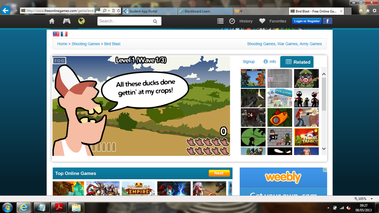 Its easy to access thousands of games online for free by simply signing up to the host site.
Advantages
* Sign up for free
* Thousands of games to choose from
* Socialise online with virtual friends
Disadvantages
* No censorship
* Shooting games, etc, may not be suitable for all users
* Adverts pop up during games
* Some costs needed for extra ammo, lives, etc
* Signing up can send spam to your inbox
Controversial issues surrounding gaming
* Racism
* Sexism
* Violence
* Digital divide
* Educational purpose
* Censorship
What is social media? Why do we use social media?
Examples: Facebook, Twitter, LinkedIn, Pinterest, Myspace
Social media consists of pages, websites, groups, that people can sign up to. Most people use these types of pages to keep up to date with the latest news of what's happening in the news, from your favourite bands, keep in touch with their friends, share photos, etc.
However, there are many disadvantages to these sites. People can remain anonymous and although some may see this as an advantage, if someone does remain anonymous, no one could really know who they are talking to or interacting with. Cyber bullying can also arise from this. Another disadvantage is that whatever you put up is 'out there'. Once it has been seen it can't be unseen which means that you must carefully choose what you wish for others to see.
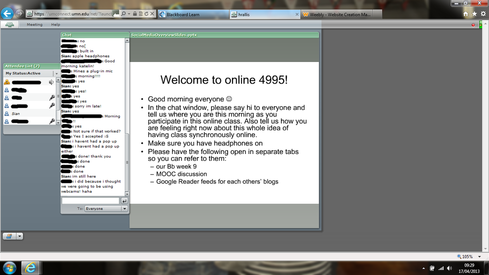 *I have blacked out other students names for privacy*
This weeks lecture was fully online, which meant that we could still attend class without having to be there in person. I much prefer to attend classes this way as it means I don't have to travel up to two hours each day to make a three hour lecture and it fits in with home life so I didn't need to arrange a babysitter. However, as we discussed, it does have its disadvantages. We spent most of the lecture fine tuning and trouble shooting any issues that developed. Some also said that as much as they preferred not having to attend class in person, it can be difficult to clarify points or even get one-on-one tutoring that you could benefit from if you were in class.
What is a MOOC?
Massive Open Online Course
The purpose of a MOOC is to provide a large scale online access point for people to learn and develop skills. They provide you with online resources videos, reading, etc; as well as online forums for you discuss content with others.
There are many different types, most are free, some offer qualifications, some don't and some offer qualifications that you have to pay for in order to receive a certificate or diploma.
Advantages
Free courses means that education can reach out to those may not necessarily be able to afford it.
Completing online courses allows for flexible learning. You can work your studies around your home life and vice versa.
Disadvantages
Can be seen as unfair if some are paying for education and others aren't.
Unable to speak one-on-one with a tutor if you are having problems.
No motivation or any sense of urgency to complete tasks, modules, etc.
Other questions that can be raised surround costs, resources etc. If courses are free who pays for the resources? Who pays online lecturers/tutors?
The idea of OTAL has been widely discussed. Is there a need for teachers or classrooms if everything we need to know is online? What are the benefits of sitting in a classroom compared to staying at home working on a computer?
Education has evolved so much over the years; chalkboards, pen, paper, Interactive Whiteboards, tablets, etc, and the argument is why not incorporate these new technologies in to education?
OTAL can be carried out in so many ways; in a teaching environment, at home, synchronously (online the same time as a teacher), asynchronously (carrying out set tasks in your own time ), even just looking something up yourself is still OTAL.
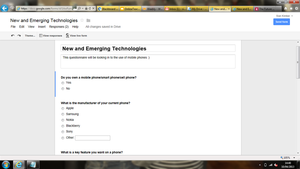 It is now possible to create a survey or questionnaire and share it directly with others via email. You are able to design it in anyway you like, with it offering many options for the recipient to reply, e.g. multiple choice, etc.
Without having to write it out by hand, it is possible to re-create it as many times as required and send it to as many people as required.
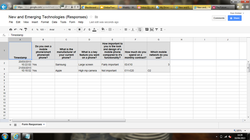 When your recipients have responded, responses are emailed back to you in a grid. This allows you to view them at ease and it is all in front of you without the need to 'tally' up yourself. Another advantage of the email is that you do not have to gather back questionnaires after they have been completed, like you would if in paper form.
Today we had a guest speaker join us. He introduced us to a website called Debate Graph. The idea behind it is to create an online mind map than can be edited, used as a demonstration/presentation tool and edited by multiple people. I was set the task to create a mind map about cyber security, using Debate Graph, however, I had great difficulty. I always try my hand at new technology, learning about it and trying it out, to discover more about it. I have always been a hands on person and after trying out this site, I found it difficult to follow and not simple enough just to create a mind map. I 'copped' out and used 'paint' instead as this was the only technological form. Although this is a very simple start to my mind map, I felt more confident creating it.
Internet security, privacy, data protection, are some of the many things that are overlooked when it comes to new technologies. How many of us can actually say that when prompted with terms and conditions to a website, they are read thoroughly? When we download a new app and it asks us if it can have access to our pictures or social networking information and we just click yes? It is imperative that we keep not only ourselves safe on the Internet but those around us as well.
The new Google Glass was released and although it seems like a great piece of technology, many issues were raised. Taking live videos and pictures of people without them knowing, possibility of cheating in exams, just some of the examples.
Social neworks are a great tool in keeping in touch with friends and family. You are able to share stories and photos, etc, but how many people would you really want looking through all your pictures of your child, partner family?? Luckily these sites have options available for you to limit who can view them.
If you look at this on the other side of the scale, by allowing users to become totally anonymous to others further problems can arise. We see it all too often, the stories on the news about people assuming different identities and pretending to be someone they are not. As much as we want to stop this from happening, how much can we actually 'police' this wihtout taking it too far and reducing and limiting access for everyone???
Google Glass is the latest emergence of technology. These glasses can be seen in some ways like a mobile phone/computer/tablet, etc. Why have many devices when only one will suffice? 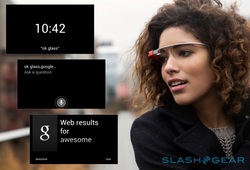 Ask them any question; time, weather, etc.
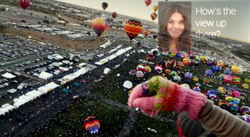 Reply to messages.
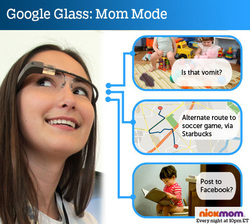 Upload pictures/videos directly to social networking sites.
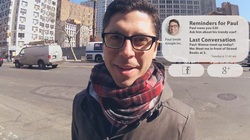 Receive live updates, messages and reminders.
These are just a few examples of what the Google Glass can do. They also allow you to connect straight to the Internet, use maps and GPS, take live pictures and videos.
With this great new technology comes risks and problems. The first being that the glasses are expensive and it is not as simple as 'popping' to the shops to buy them. Another is data protection. As you are walking around you are capturing people in pictures and videos, without realising and without them knowing. A final point is in regards to exams in school. If a pupil is wearing these glasses, it would be far too easy to gain the answers through messaging friends or finding the answer through a search engine.
|
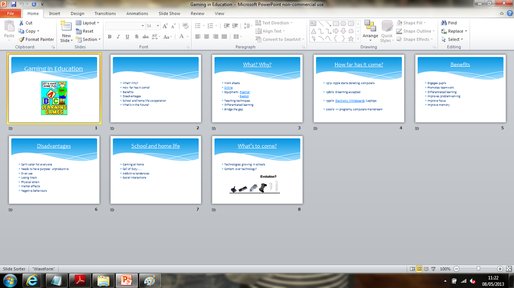




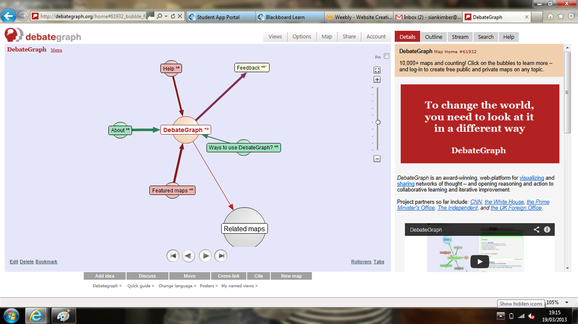
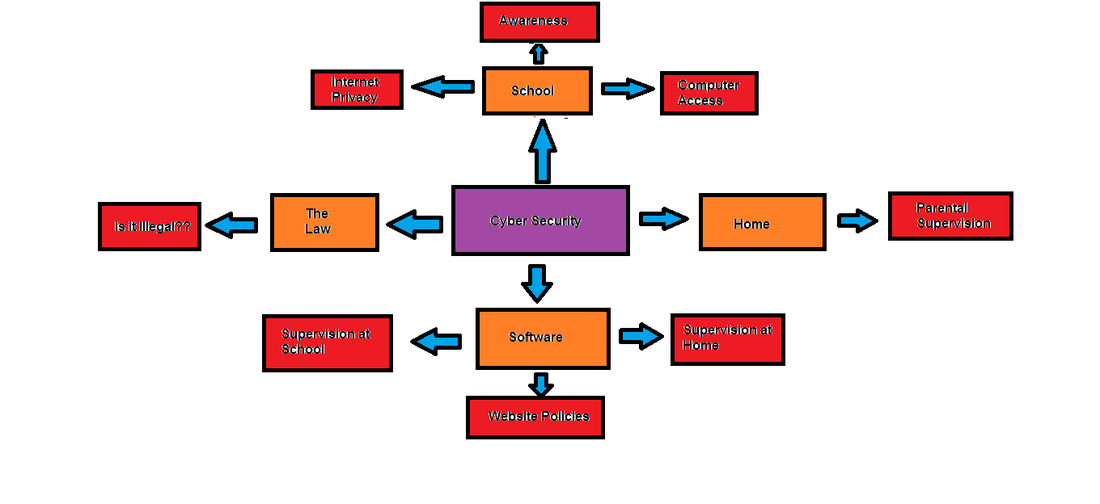
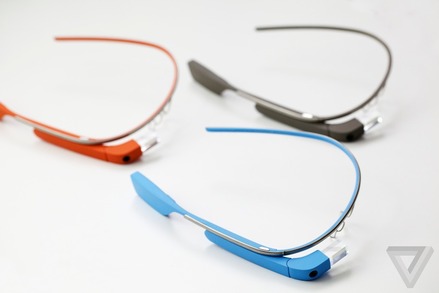




 RSS Feed
RSS Feed